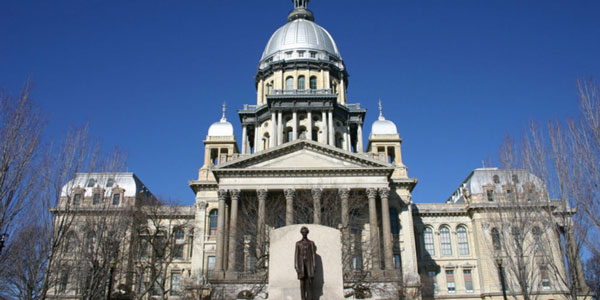By Rory D. Sweeney, Ted Caddell and Amanda Durish Cook
Illinois officials moved closer to a deal to save Exelon’s Clinton and Quad Cities nuclear plants as legislation cleared a House committee and the company reportedly reached agreement with Gov. Bruce Rauner on changes to reduce the bill’s cost.
The House Energy Committee voted 10-1 on Tuesday to send the bill — which would provide Exelon $235 million a year in subsidies for 13 years — to the House floor (SB 2814). Overnight negotiations with Rauner’s office have secured his approval as well, Crain’s Chicago Business reported.
“While there is still a lot of work to be done, we are pleased to have an understanding with the governor’s office and continue to work with the four leaders and their professional staffs, as well as other stakeholders and the bill’s more than 200 other supporters, to move this bill forward,” Exelon spokesman Paul Adams said Wednesday. “With today’s progress, we are all one step closer to saving thousands of jobs in Illinois.”
The negotiations with Rauner’s office resulted in a statewide cap on rate increases, removing ratepayer funding for two microgrids and a reduction in funding for solar development, Crain’s said. Subsidies for Dynegy coal plants in southern Illinois and a proposed “grid impact rate” — which would have based power bills on peak use instead of overall usage — had already been removed from the bill that cleared the House committee, the Quad-City Times reported.
Dynegy spokesman David Onufer said the company has withdrawn its support as a result of the elimination of aid for generation in the southern part of the state.
“Leaving out this provision leaves behind Illinois residents and communities in central and southern Illinois. The bill now only helps the few and does not protect the downstate jobs and the economy,” Onufer said. “The flawed downstate energy market doesn’t allow plants to recover costs. Nearly 20% of downstate Illinois’ generating capacity has already been retired or mothballed this year.”
Exelon threatened in May to shut down the money-losing Clinton and Quad Cities nuclear plants if the state didn’t provide subsidies, such as the emissions credits proposed in the new bill. (See Bill to Save Coal, Nuclear Plants Introduced in Illinois.)
A variety of organizations, such as the Illinois Manufacturers’ Association, the Illinois attorney general’s office and AARP Illinois, have criticized the proposal for raising customers’ bill too much. They were hoping to find alternative economic tools to keep the nuclear facilities open, the Times reported.
Several environmental groups, including the Illinois Clean Jobs Coalition, the Sierra Club and the Natural Resources Defense Council, are supportive of renewable energy incentives in the bill. The Citizens Utility Board also supports it. It’s unclear, however, whether the changes negotiated with Rauner will cause the bill to lose support.
Lawmakers representing the regions home to the generating plants are also supportive. Republican State Rep. Bill Mitchell had been concerned the bill had become too big to remain stable and was pleased Rauner got involved.
“It’s always been my concern that the bill gets so big, it collapses, just like a gaming bill usually does,” he told Illinois Public Media. “They get so big, they collapse under their own weight. The alternative to have no bill is not good for the state of Illinois.”
Lawmakers have little time to complete their work as the legislature’s current “veto” session is due to end Thursday.




